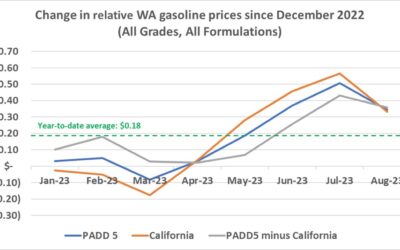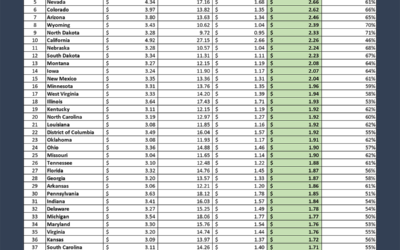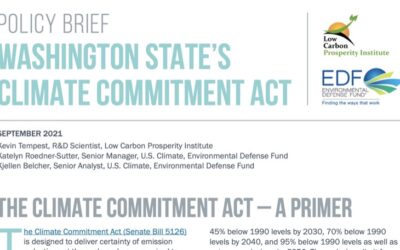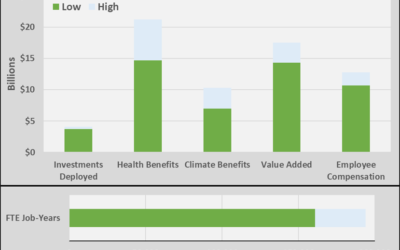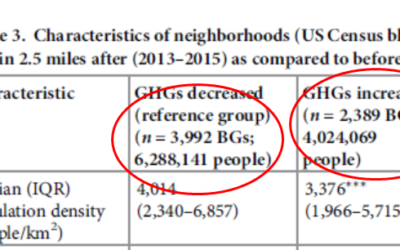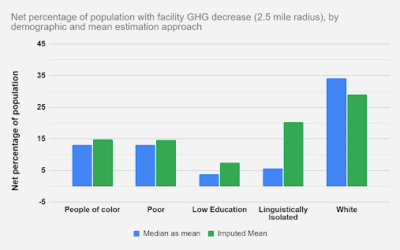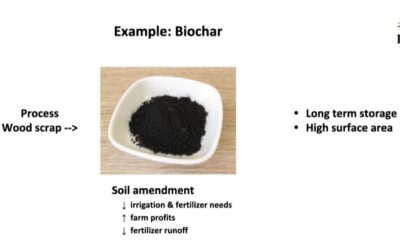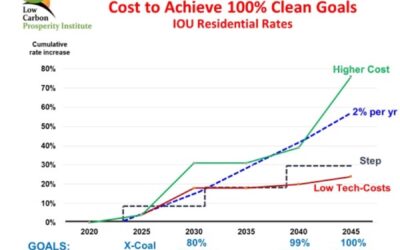Research Highlights
The Real World: Climate Commitment Act and Gas Prices
The traditional spring ramp-up in gasoline prices is underway, providing context for understanding why persistent claims of large gasoline price impacts from the Climate Commitment Act are misleading. Gas prices are going up as they always do this time of year, after...
Call for nominations
Governor Jay Inslee presented the first annual David & Patricia Giuliani Clean Energy Entrepreneur Award to Kenworth Truck Company. The second award winner was Myno Carbon. The third award presentation will be at our upcoming Future of Carbon Policy Forum, and nominations are now open.
Do Climate Commitment Act allowance prices get passed through to the pump?
Compared to a simple pass-through assumption on allowance prices (non-consigned average $53.32 through August’s APCR auction, translating to 42 cents per gallon of gasoline), the WA vs. OR year-to-date average of 27 cents per gallon indicates around 70% pass-through. This level of pass-through is consistent with the range described in the peer-reviewed literature.
State Rankings of Fuel Savings by Switching to Electric Vehicles
Washington’s Decisive Decade
Washington’s Decisive Decade An Emerging Roadmapfor Transportation Decarbonization& Cleaner AirWith the transportation sector accounting for 45% of the state’s emissions, it will receive the majority of upcoming investments from the Climate Commitment Act (CCA)....
Press Release: GROUNDBREAKING REPORT RELEASED ON DECARBONIZING WA’S TRANSPORTATION SYSTEMS
(SEATTLE, WA) February 8, 2022– Standing in front of a new all-electric forty-five foot motorcoach and only the 2nd Kenworth all-electric class 8 tractor truck off the Renton manufacturing line, Clean & Prosperous Washington (CaPWA) released its first in-depth...
What are the facts about the Climate Commitment Act?
As the Climate Commitment Act (CCA) moves to implementation, many Washingtonians have questions about what it does and how it works. Policy experts from our research team at the Clean & Prosperous Institute (CaPI) along with the Environmental Defense Fund (EDF) ...
Technical Memo: The Climate Commitment Act delivers jobs and reduces pollution
Kevin Tempest, Clean & Prosperous Institute This technical memo presents modelled jobs and other benefits from investments through 2030 that could be catalyzed by revenue from Substitute Senate Bill 5126 (SB5126), the Climate Commitment Act. In this technical memo, I...
Part 2: Revisiting the Key Findings of an influential Carbon Trading and Environmental Equity Study – Additional Details
In Part 1, I revisited some of the key findings from the influential study by Lara Cushing and Rachel Morello-Frosch et al. (Carbon trading, co-pollutants, and environmental equity: Evidence from California’s cap-and-trade program (2011-2015)) In this Part 2, I...
Part 1: Revisiting the Key Findings of a California Carbon Market and Environmental Equity Study
Likely the most widely-cited and influential analysis of California’s pollution-equity trends in the first several years of its Cap-and-Invest program is a 2018 paper led by Lara Cushing and Rachel Morello-Frosch titled Carbon trading, co-pollutants, and environmental...
BioSequestration Policy Pathways
BioSequestration Policy Pathways
A policy research and evaluation effort led by:
The Clean & Prosperous Institute
Our Operating Framework
Climate change is real, caused mostly by combusting fossil fuels
It’s a crisis –
Risk to our health, way of life, and economy
IPCC: we only have 10 years to cut net emissions in half.
The severity of the crisis depends on the net of:
+ Ongoing GHGs emissions
– Atmospheric GHGs absorbed and stored on the planet (“sequestration”)
Bio-sequestration can
play a major role in meeting our net reductions
~30% of gross emissions are being offset by naturally occurring biosequestration
Create a stable and growing financial boon for Rural America – “farming carbon”
Analysis of 100% Clean Bill (SB 5116) Cost Cap
This updated Clean & Prosperous Institute (CaPI) analysis examines the rate impacts of eliminating coal power, achieving an 80% clean energy standard by the year 2030, and a 100% clean energy standard by the year 2045. CaPI relies on a variety of sources, and deploys its own utility-specific model.



